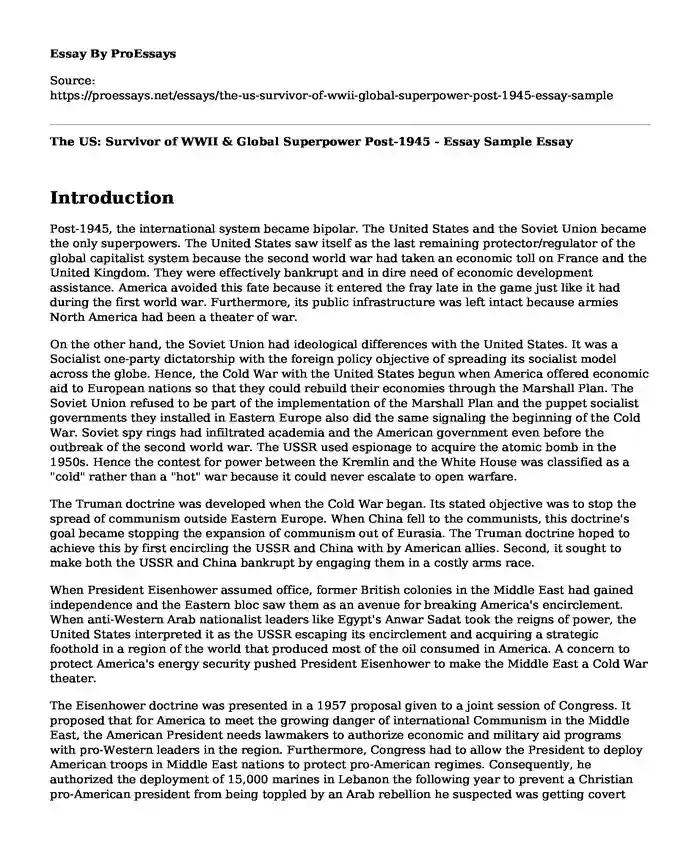Introduction
Post-1945, the international system became bipolar. The United States and the Soviet Union became the only superpowers. The United States saw itself as the last remaining protector/regulator of the global capitalist system because the second world war had taken an economic toll on France and the United Kingdom. They were effectively bankrupt and in dire need of economic development assistance. America avoided this fate because it entered the fray late in the game just like it had during the first world war. Furthermore, its public infrastructure was left intact because armies North America had been a theater of war.
On the other hand, the Soviet Union had ideological differences with the United States. It was a Socialist one-party dictatorship with the foreign policy objective of spreading its socialist model across the globe. Hence, the Cold War with the United States begun when America offered economic aid to European nations so that they could rebuild their economies through the Marshall Plan. The Soviet Union refused to be part of the implementation of the Marshall Plan and the puppet socialist governments they installed in Eastern Europe also did the same signaling the beginning of the Cold War. Soviet spy rings had infiltrated academia and the American government even before the outbreak of the second world war. The USSR used espionage to acquire the atomic bomb in the 1950s. Hence the contest for power between the Kremlin and the White House was classified as a "cold" rather than a "hot" war because it could never escalate to open warfare.
The Truman doctrine was developed when the Cold War began. Its stated objective was to stop the spread of communism outside Eastern Europe. When China fell to the communists, this doctrine's goal became stopping the expansion of communism out of Eurasia. The Truman doctrine hoped to achieve this by first encircling the USSR and China with by American allies. Second, it sought to make both the USSR and China bankrupt by engaging them in a costly arms race.
When President Eisenhower assumed office, former British colonies in the Middle East had gained independence and the Eastern bloc saw them as an avenue for breaking America's encirclement. When anti-Western Arab nationalist leaders like Egypt's Anwar Sadat took the reigns of power, the United States interpreted it as the USSR escaping its encirclement and acquiring a strategic foothold in a region of the world that produced most of the oil consumed in America. A concern to protect America's energy security pushed President Eisenhower to make the Middle East a Cold War theater.
The Eisenhower doctrine was presented in a 1957 proposal given to a joint session of Congress. It proposed that for America to meet the growing danger of international Communism in the Middle East, the American President needs lawmakers to authorize economic and military aid programs with pro-Western leaders in the region. Furthermore, Congress had to allow the President to deploy American troops in Middle East nations to protect pro-American regimes. Consequently, he authorized the deployment of 15,000 marines in Lebanon the following year to prevent a Christian pro-American president from being toppled by an Arab rebellion he suspected was getting covert material as well as financial support from the USSR.
President Kennedy believed that America and the Soviet Union could peacefully co-exist. Hence, America did not need to keep using the aggressive policies of President Eisenhower. However, after it became clear that the USSR were building nuclear missile sites on the island of Cuba, his approach changed. He determined that the best way of dealing with the USSR was to use diplomacy combined with an overt threat that America will used its military to achieve its foreign policy goals. His approach got the Soviet removed from Cuba in exchange for American missiles being removed from Turkey. Later, in 1963, he used his strategy to secure the first bilateral agreement with the USSR to limit nuclear weapons development and testing.
Cite this page
The US: Survivor of WWII & Global Superpower Post-1945 - Essay Sample. (2023, May 06). Retrieved from https://proessays.net/essays/the-us-survivor-of-wwii-global-superpower-post-1945-essay-sample
If you are the original author of this essay and no longer wish to have it published on the ProEssays website, please click below to request its removal:
- Liberalism: Its Origin and Role Essay
- Dear America: Letters Home From Vietnam
- The September 11 Terrorist Attacks in the US: The Implications
- Essay Sample on Indigenous and Europeans Relations in the 16th and 17th
- Essay Example on Government: A Powerful Social Institution Powering Society
- Trump Scandal Intensifies: Whistleblower Complaint Alleges Abuse of Power - Essay Sample
- Paper Example on Protecting Civil Liberties: A Crucial Role in American Society







